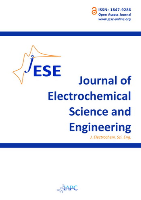
Journal of Electrochemical Science and Engineering
Scope & Guideline
Pioneering Knowledge in Electrochemical Technologies.
Introduction
Aims and Scopes
- Electrochemical Sensors and Biosensors:
The journal publishes research on the development and application of electrochemical sensors, particularly those utilizing novel materials for the detection of biological, environmental, and chemical analytes. - Energy Storage and Conversion Technologies:
Research on batteries, supercapacitors, and fuel cells, including advancements in electrode materials, electrolytes, and overall system performance, is a significant focus area. - Corrosion Science and Engineering:
Studies addressing corrosion mechanisms, prevention strategies, and the development of corrosion-resistant materials are routinely featured, highlighting the importance of electrochemistry in extending the lifespan of materials. - Electrochemical Processes in Environmental Applications:
The journal includes articles on the application of electrochemical techniques for wastewater treatment, pollutant detection, and resource recovery, reflecting the growing concern for environmental sustainability. - Material Science in Electrochemistry:
Research on the synthesis, characterization, and application of novel materials, including nanomaterials and composites, for various electrochemical applications is a critical area of focus.
Trending and Emerging
- Advanced Materials for Energy Applications:
There is a growing emphasis on the development of advanced materials, such as nanomaterials and composites, for improving the performance of energy storage devices and fuel cells. - Biocompatible Electrochemical Systems:
Research into biocompatible materials and systems for biomedical applications is on the rise, particularly in the context of sensors and drug delivery systems. - Sustainable and Green Electrochemistry:
An increasing number of studies focus on sustainable practices in electrochemistry, including the use of renewable resources and environmentally friendly processes in sensor and energy device development. - Electrochemical Techniques in Wastewater Treatment:
The application of electrochemical processes for treating wastewater and recovering valuable resources is emerging as a significant trend, reflecting a broader interest in environmental remediation. - Integration of Artificial Intelligence in Electrochemistry:
The incorporation of AI and machine learning techniques to optimize electrochemical processes and materials development is gaining momentum, indicating a future direction for research.
Declining or Waning
- Traditional Corrosion Inhibitors:
Research on conventional organic corrosion inhibitors has decreased as the focus shifts towards greener and more sustainable alternatives, such as biobased inhibitors. - Basic Electrochemical Theory:
While foundational electrochemical theory remains important, the journal has seen fewer publications focused solely on theoretical aspects without accompanying experimental validation or application. - Electrochemical Methods in Non-Energy Applications:
There has been a notable decline in studies applying electrochemical methods to non-energy applications, such as traditional analytical chemistry, as researchers increasingly target energy-related innovations. - Single-Fuel Microbial Fuel Cells:
Research specifically focused on single-fuel microbial fuel cells has declined, likely due to a broader interest in multi-fuel systems that can optimize energy output.
Similar Journals
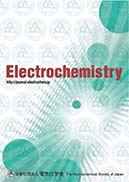
ELECTROCHEMISTRY
Advancing Electrochemical Innovation WorldwideELECTROCHEMISTRY is an esteemed journal published by the Electrochemical Society of Japan, dedicated to advancing the field of electrochemical science and technology. With an ISSN of 1344-3542 and an E-ISSN of 2186-2451, this journal has been providing a platform for scholarly communication since its inception in 1996, with a converged scope extending to 2024. As an Open Access publication since 2020, it facilitates the wide dissemination of research, fostering collaboration among researchers, professionals, and students alike. Currently positioned in Q3 of the electrochemistry category and ranking 52 out of 60 in Scopus, ELECTROCHEMISTRY is committed to publishing high-quality, peer-reviewed articles that explore novel electrochemical systems, applications, and methodologies. With its base in Tokyo, Japan, the journal serves a global audience, promoting cutting-edge research that drives innovation in energy, materials science, and analytical chemistry.
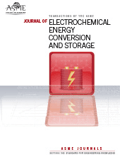
Journal of Electrochemical Energy Conversion and Storage
Elevating Knowledge in Electrochemical InnovationsThe Journal of Electrochemical Energy Conversion and Storage, published by ASME, is a premier platform for cutting-edge research in the fields of electrochemistry, energy engineering, and materials science. With an ISSN of 2381-6872 and an E-ISSN of 2381-6910, this journal aims to disseminate high-quality articles that contribute to the understanding and application of energy conversion and storage technologies. Notably recognized in the 2023 Category Quartiles as Q2 in multiple categories including Electronic, Optical and Magnetic Materials, Energy Engineering and Power Technology, and Mechanical Engineering, it reflects a strong academic impact within its field. The journal also boasts competitive Scopus rankings, highlighting its relevance and influence across disciplines. Operating under an open access model, the journal ensures that research findings are widely accessible, fostering collaboration and innovation among researchers, professionals, and students globally. As we move toward a more sustainable future, the Journal of Electrochemical Energy Conversion and Storage plays a critical role in advancing technologies that promise to reshape how we harness and utilize energy.

Analytical & Bioanalytical Electrochemistry
Pioneering Research in Electrochemical AnalysisAnalytical & Bioanalytical Electrochemistry is a pivotal journal dedicated to the advancement of research and innovation in the fields of analytical chemistry and electrochemistry. Published by the University of Tehran, Faculty of Chemistry, Center of Excellence in Electrochemistry, this journal has been contributing to the scientific community since its inception in 2009 and continues to be a critical platform through 2024. With an ISSN of 2008-4226, it focuses on a variety of topics including electrochemical sensors, bioanalytical techniques, and innovative methodologies in electrochemical analysis. Although it currently holds a Q4 quartile ranking in both analytical chemistry and electrochemistry categories, its unique insights and research findings are essential for advancing knowledge and fostering interdisciplinary collaboration within the scientific community. Researchers, professionals, and students engaged in these dynamic fields will find valuable resources and contribute to the ongoing discourse by publishing their work in this journal. We invite you to explore and engage with the diverse content that Analytical & Bioanalytical Electrochemistry offers to enhance your research and professional development.

RUSSIAN JOURNAL OF ELECTROCHEMISTRY
Advancing Research in Electrochemical TechnologiesThe Russian Journal of Electrochemistry, published by Pleiades Publishing Inc, is a reputable scientific resource that caters to the dynamic field of electrochemistry. Since its inception in 1996, this journal has become a platform for the dissemination of cutting-edge research, exploring both foundational studies and innovative applications within electrochemical science. Despite currently holding a Q4 categorization in its field, the journal is dedicated to enhancing its scholarly impact and visibility, reflecting its commitment to fostering advancements in electrochemical technologies. With its ISSN 1023-1935 and E-ISSN 1608-3342, the journal strives to reach a global audience of researchers, professionals, and students alike. Though the journal is not open access, its contents are crucial for anyone looking to stay at the forefront of electrochemical research and developments. The journal's editorial board includes well-respected experts, ensuring that published articles contribute significantly to the scientific community and pave the way for future innovations in the field.
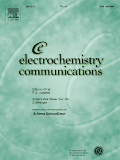
ELECTROCHEMISTRY COMMUNICATIONS
Bridging Theory and Practice in Electrochemical ResearchELECTROCHEMISTRY COMMUNICATIONS, published by ELSEVIER SCIENCE INC, is a leading journal in the field of electrochemistry, holding a prestigious position in the Q1 quartile since 2023. With an impact factor reflecting its esteemed reputation, the journal ranks #15 out of 60 in the Scopus Chemistry category for Electrochemistry, placing it in the 75th percentile. Since adopting an Open Access model in 2019, it has garnered widespread visibility and accessibility, enabling researchers and professionals to share groundbreaking findings and foster innovation. Covering a wide range of topics from fundamental electrochemical research to practical applications, ELECTROCHEMISTRY COMMUNICATIONS serves as a critical platform for disseminating knowledge and advancing the field. The journal's commitment to quality and relevance positions it as a vital resource for academics and practitioners striving to stay at the forefront of electrochemical science.

Electrochemical Science Advances
Pioneering Discoveries in Electrochemical ResearchElectrochemical Science Advances, published by WILEY, is an esteemed Open Access journal that has been making significant contributions to the field of electrochemistry since its inception in 2021. With an ISSN of 2698-5977, this journal serves as a vital platform for researchers and practitioners looking to disseminate their findings on a diverse range of topics within the electrochemical sciences and related areas. The journal has achieved commendable rankings in the Scopus database, placing it in the 2nd quartile in Chemistry (miscellaneous) and the 3rd quartile in Electrochemistry, highlighting its relevance and growing influence in the academic community. As it converges from 2021 to 2024, Electrochemical Science Advances aims to foster collaboration and innovation, offering a vital resource for students, professionals, and researchers dedicated to advancing knowledge and technology in electrochemistry. Access to this cutting-edge research is straightforward, allowing for a comprehensive engagement with the latest advances in the field.

Energy Material Advances
Shaping the Landscape of Renewable Energy ResearchEnergy Material Advances, published by the American Association for the Advancement of Science, stands at the forefront of energy research, showcasing groundbreaking studies in the realm of renewable energy, fuel technology, and materials science. With the journal's commitment to open access since 2020, it aims to democratize knowledge and foster innovation across a global community of researchers, professionals, and students. The journal boasts an impressive impact factor, placing it firmly within the Q1 category across multiple disciplines including Energy (miscellaneous), Fuel Technology, and Renewable Energy, Sustainability and the Environment, highlighting its significance in advancing scholarly discussions. In the latest Scopus rankings, Energy Material Advances ranks among the top 10% of journals in its field, affirming its role as a pivotal resource for current and emerging trends in energy materials. The journal is dedicated to facilitating collaborative efforts and inspiring novel approaches to the challenges posed by energy sustainability and technological advancement.

Journal of the Korean Electrochemical Society
Empowering Research in Electrochemical Science and TechnologyJournal of the Korean Electrochemical Society (ISSN: 1229-1935, E-ISSN: 1229-1935) stands as a prominent publication in the rapidly evolving field of electrochemistry. Published by the prestigious Korean Electrochemical Society, this journal serves as a vital platform for researchers, professionals, and students eager to disseminate and access cutting-edge studies related to electrochemical processes, materials, and technologies. With an emphasis on promoting innovative research and practical applications, the journal aims to foster collaboration and knowledge exchange within the global electrochemistry community. Although not an open access journal, it provides comprehensive and rigorous peer-reviewed content that ensures the highest scientific quality, making it a valuable resource for anyone involved in the field. Located in Seoul, South Korea, it continues to contribute significantly to the advancement of electrochemical sciences, addressing key challenges and developments that shape the future of technology and environmental sustainability.
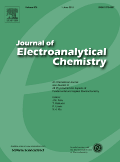
Journal of Electroanalytical Chemistry
Unveiling the Future of Electroanalytical ChemistryThe Journal of Electroanalytical Chemistry, published by Elsevier Science SA, stands as a leading platform for the dissemination of cutting-edge research in the field of electroanalytical science. With an impressive impact factor that reflects its esteemed reputation—ranking in the Q1 category for both Analytical Chemistry and Chemical Engineering, alongside a strong presence in Electrochemistry—this journal provides a vital resource for researchers, professionals, and students alike. Covering topics from fundamental electrochemical processes to innovative analytical techniques, the journal aims to foster an in-depth understanding and discussion of contemporary advancements in electroanalytical methodologies. Operating under a model that prioritizes quality and rigor, it facilitates access to high-quality manuscripts and reviews that contribute to the advancement of the field. For over six decades, from 1959 to 2024, it has played an intrinsic role in shaping the landscape of electrochemistry, continually driving forward the frontiers of knowledge and application.

Energy Materials
Exploring Breakthroughs in Energy Materials Science.Energy Materials is a pioneering journal published by OAE PUBLISHING INC, dedicated to the dynamic field of energy materials science and engineering. With a focus on advancing knowledge related to materials used in various energy applications such as batteries, fuel cells, and solar cells, this open-access journal aims to disseminate cutting-edge research and innovative methodologies to a global audience. By offering a platform for original research, reviews, and case studies, Energy Materials plays a crucial role in bridging the gap between materials science and energy technology, facilitating the development of sustainable energy solutions. Researchers, professionals, and students alike will find invaluable insights in its pages, fostering advancements in this essential sector. To explore the latest developments in energy materials, visit Energy Materials at OAE PUBLISHING INC.